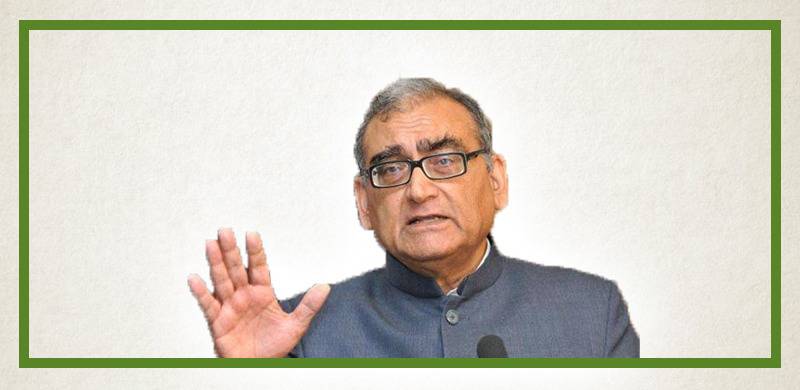
Justice Markandey Katju writes that judges should not lose temper in the courts. Rude behavior like shouting and screaming, insulting language, threatening contempt proceedings against lawyers for perceived repetition do not behove judges.
A senior Supreme Court Judge of India recently lost his temper in court at a senior Supreme Court lawyer, allegedly because the latter was repeating an argument which had already been made by another lawyer in the same case, and at his retort.
The judge reportedly threatened to take contempt of court proceedings against the lawyer and convict him. At this remark, the senior lawyer walked out of the courtroom, obviously since he could not bear the insult.
I am in America presently and I read about the incident on the internet. So I sent an email to the senior lawyer concerned asking for his version, but he did not respond. However, several lawyers of the Indian Supreme Court have told me that this particular judge is very rude to lawyers in court.
I also inquired about the incident from another Senior Advocate of the Supreme Court, who confirmed that the judge is very rude. He also wrote “The level of gratuitous rudeness in the Supreme Court has increased to a point that it has become insufferable. Hopefully, the new judges will restore the balance, unless while sitting with their seniors they have assumed that rudeness is the due process of the Court “.

He also mentioned the previous CJI Gogoi, who was known for his discourteous behaviour in court (apart from his other well-known failings), telling in court Fali Nariman, Kapil Sibal, Dushyant Dave, Rajiv Dhavan and other eminent senior lawyers that none of them deserved to be heard.
In my opinion, losing temper by judges in court, rude behavior like shouting and screaming, insulting language, threatening contempt proceedings against lawyers for perceived repetition and retorts, and threatening to have them thrown out of court or convicted etc do not behove judges, particularly those in the higher judiciary, and are wholly uncalled for.
No doubt judges have to control court proceedings, but this must be done in a dignified manner. Ugly display of temper by a judge in court not only lowers their dignity, but may even lead to injustice, for when one loses his temper he is prone to commit a mistake.
The higher one moves up a hierarchy, the more humble and courteous he must become.
Judges of the Supreme Court are at the apex of the judicial hierarchy, and so must be particularly humble and polite. Every written sentence of theirs becomes the law of the land in India (vide Article 141 of the Indian Constitution). This tremendous power comes coupled with tremendous responsibility, and this calls for calm, placid and unperturbed behavior in court and a tranquil and serene frame of mind.
In the early years of the Indian Supreme Court there were Judges like Justices Patanjali Shastri, BK Mukherji, Vivian Bose, Fazl Ali etc who were not only very erudite but also very polite and humble. I may give an illustration.
Once a very senior and very old lawyer of Allahabad High Court, Mr Shyam Kishan Dar, came to Delhi in the 1950s to argue a case before the Supreme Court. He was then in his 80s and was hard of hearing. He was also known to be a bit short tempered and unsophisticated in his language.
While arguing his case he felt the judges were unnecessarily interrupting him and not following him, so he turned to his junior and abused the judges.
Instead of taking contempt proceedings against him, the judges calmly said to the junior counsel, “Mr Counsel, we respect Mr Dar a lot, but he seems to be upset. Have we done anything wrong? We apologise if we have “.
Can one imagine such a thing happening today? It appears that this trend is reversed today, and lack of erudition among many Indian judges is accompanied with arrogance, a short fuse and an over touchy nature taking offense even over trivialities.
A senior Supreme Court Judge of India recently lost his temper in court at a senior Supreme Court lawyer, allegedly because the latter was repeating an argument which had already been made by another lawyer in the same case, and at his retort.
The judge reportedly threatened to take contempt of court proceedings against the lawyer and convict him. At this remark, the senior lawyer walked out of the courtroom, obviously since he could not bear the insult.
I am in America presently and I read about the incident on the internet. So I sent an email to the senior lawyer concerned asking for his version, but he did not respond. However, several lawyers of the Indian Supreme Court have told me that this particular judge is very rude to lawyers in court.
I also inquired about the incident from another Senior Advocate of the Supreme Court, who confirmed that the judge is very rude. He also wrote “The level of gratuitous rudeness in the Supreme Court has increased to a point that it has become insufferable. Hopefully, the new judges will restore the balance, unless while sitting with their seniors they have assumed that rudeness is the due process of the Court “.

He also mentioned the previous CJI Gogoi, who was known for his discourteous behaviour in court (apart from his other well-known failings), telling in court Fali Nariman, Kapil Sibal, Dushyant Dave, Rajiv Dhavan and other eminent senior lawyers that none of them deserved to be heard.
In my opinion, losing temper by judges in court, rude behavior like shouting and screaming, insulting language, threatening contempt proceedings against lawyers for perceived repetition and retorts, and threatening to have them thrown out of court or convicted etc do not behove judges, particularly those in the higher judiciary, and are wholly uncalled for.
No doubt judges have to control court proceedings, but this must be done in a dignified manner. Ugly display of temper by a judge in court not only lowers their dignity, but may even lead to injustice, for when one loses his temper he is prone to commit a mistake.
The higher one moves up a hierarchy, the more humble and courteous he must become.
Judges of the Supreme Court are at the apex of the judicial hierarchy, and so must be particularly humble and polite. Every written sentence of theirs becomes the law of the land in India (vide Article 141 of the Indian Constitution). This tremendous power comes coupled with tremendous responsibility, and this calls for calm, placid and unperturbed behavior in court and a tranquil and serene frame of mind.
In the early years of the Indian Supreme Court there were Judges like Justices Patanjali Shastri, BK Mukherji, Vivian Bose, Fazl Ali etc who were not only very erudite but also very polite and humble. I may give an illustration.
Once a very senior and very old lawyer of Allahabad High Court, Mr Shyam Kishan Dar, came to Delhi in the 1950s to argue a case before the Supreme Court. He was then in his 80s and was hard of hearing. He was also known to be a bit short tempered and unsophisticated in his language.
While arguing his case he felt the judges were unnecessarily interrupting him and not following him, so he turned to his junior and abused the judges.
Instead of taking contempt proceedings against him, the judges calmly said to the junior counsel, “Mr Counsel, we respect Mr Dar a lot, but he seems to be upset. Have we done anything wrong? We apologise if we have “.
Can one imagine such a thing happening today? It appears that this trend is reversed today, and lack of erudition among many Indian judges is accompanied with arrogance, a short fuse and an over touchy nature taking offense even over trivialities.
